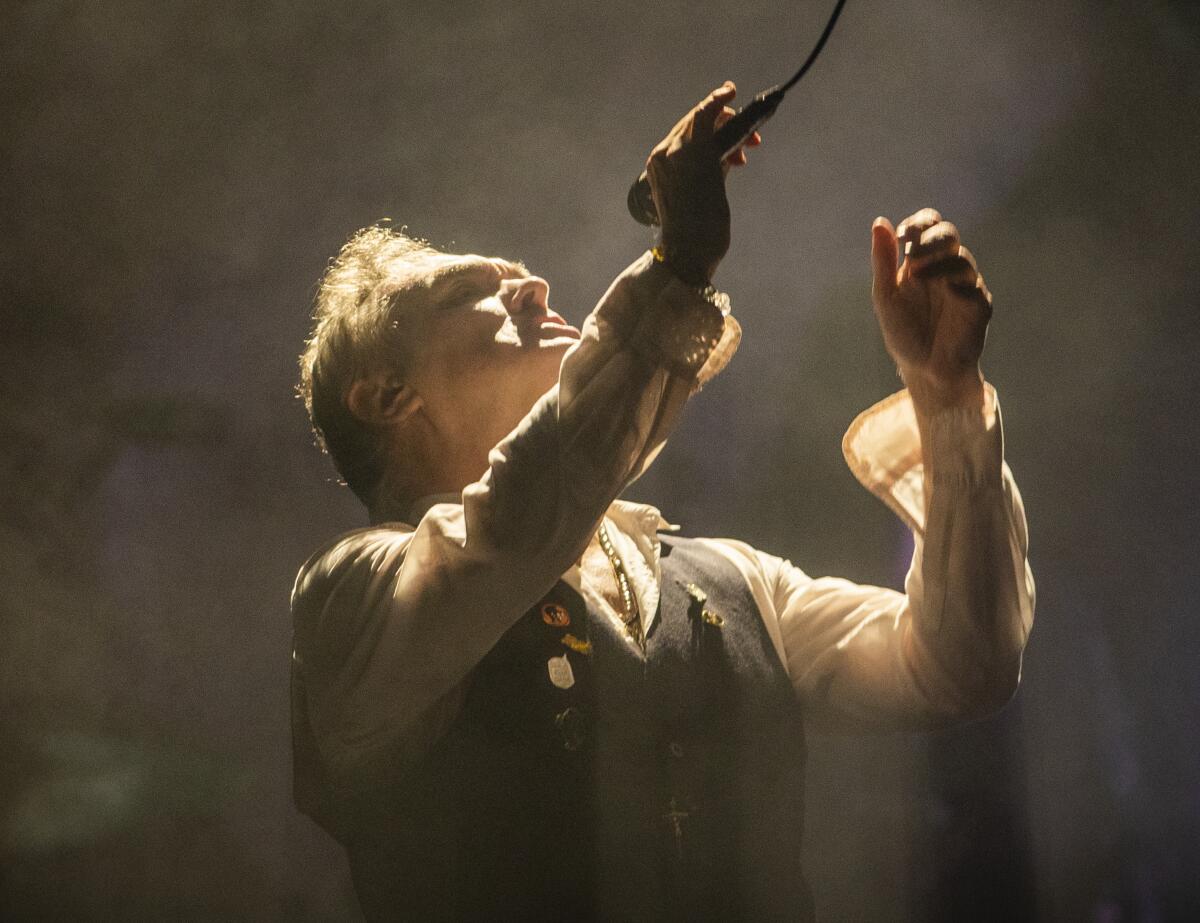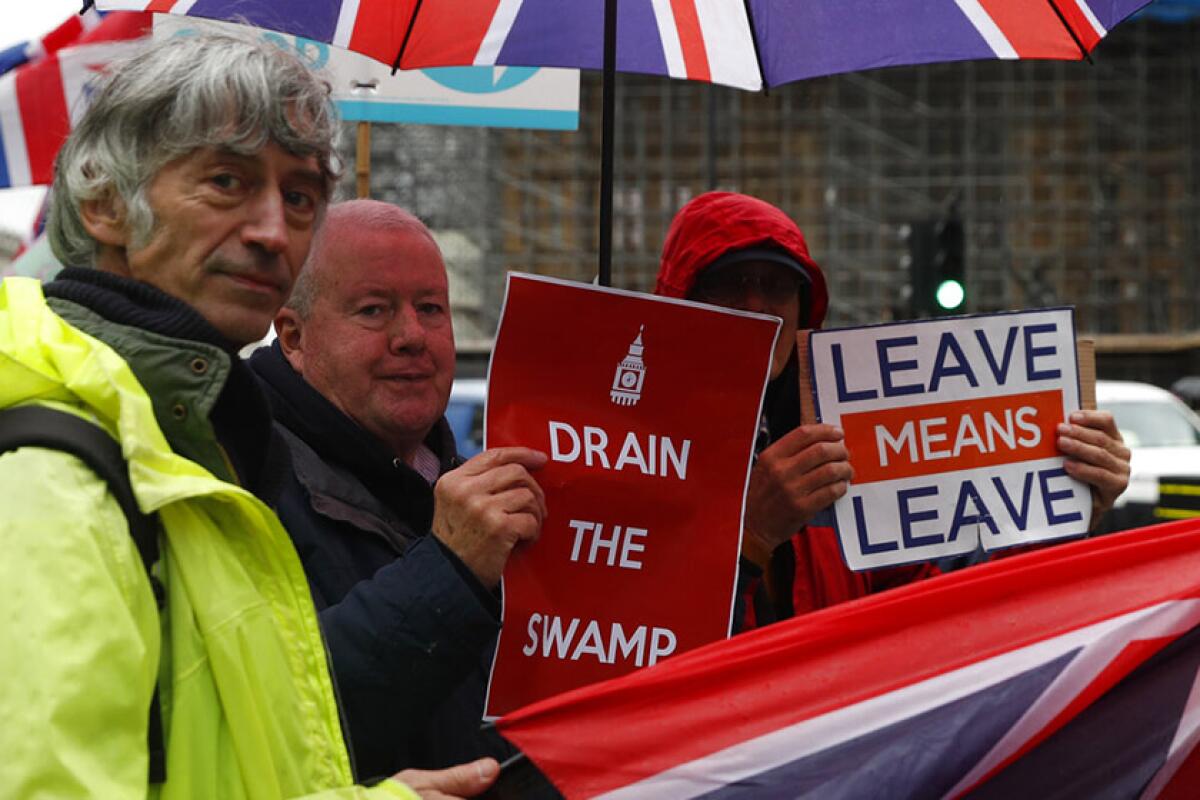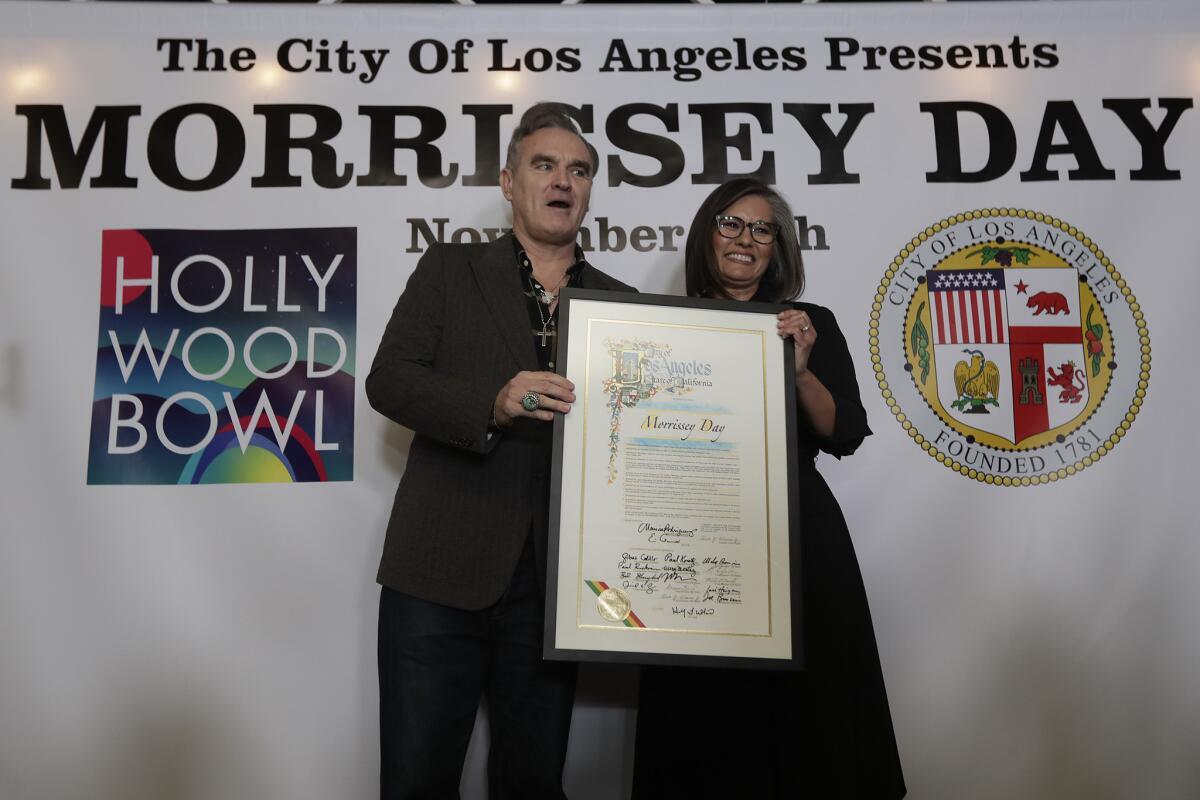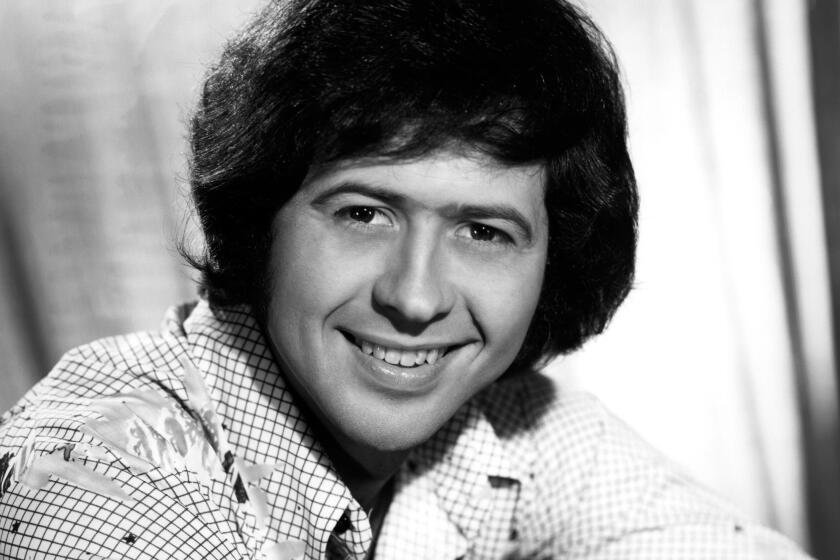Morrissey is anti-immigrant and backs a white nationalist political party. Why don’t fans care?

- Share via
For years, when professor Melissa Mora Hidalgo wasn’t teaching classes at Cal State Fullerton or UC San Diego, the Los Angeles-based culture writer could often be found on stages throughout the region, singing songs made famous by her musical hero, British rock star Morrissey.
With her hair piled up in the singer’s familiar rockabilly pompadour, Hidalgo, under her alter ego “Mélissey” and backed by an all-female band, would cosplay at Morrissey club nights, crooning heartfelt renditions of his two decades of beloved outsider alternative-rock hits, including those from his star-making turn as leader of 1980s Brit-pop quartet the Smiths.
Hidalgo, author of the 2016 book “Mozlandia: Morrissey Fans in the Borderlands,” says that from an early age she was drawn to the singer, “both the music and the look. My fandom was really about the songs, the music, his brattiness. I loved that. And as a butch, as a queer woman, I wanted my hair like his. I wanted to look like him.”

But when Morrissey closes out his tour at the Hollywood Bowl on Saturday, Oct. 26, in support of his recent album, “California Son,” Hidalgo won’t be there. “I don’t have it in me,” she says with a sigh. In recent years, Morrissey has pushed a political and social agenda that she can no longer ignore.
The singer is nothing if not a provocateur. A vegan and fervid supporter of animal rights, in 2010 he seemed to indict a whole population when he said to the Guardian, “Did you see the thing on the news about [China’s] treatment of animals and animal welfare? Absolutely horrific. You can’t help but feel that the Chinese are a subspecies.” In response to a question about Harvey Weinstein’s downfall, Morrissey told German magazine Der Spiegel, “I hate rape. I hate attacks. I hate sexual situations imposed on someone. But in many cases, one looks at the circumstances and thinks that the person referred to as victim is merely disappointed.”
Closer to his home, Morrissey declared “London is debased” on his website in 2018 before demeaning Mayor Sadiq Khan’s accent, writing, “He cannot talk properly!”
A vocal supporter of the controversial Brexit plan to withdraw the United Kingdom from the European Union, Morrissey has been increasingly speaking out against England’s liberal-leaning immigration policies, and has expressed his allegiance to For Britain, a far-right political party. For Hidalgo, that stance reveals what few of his stateside fans seem willing to acknowledge: “The bad rhetoric that Morrissey espouses, and that the party espouses, on these shores would be Trumpism. On these shores that would be MAGA.”
Earlier this year, he reposted a video on his website by an anonymous pro-Brexit blogger who, amid rants on “social justice morons” and “white discontent,” contrasted the ways in which the press covered successful rapper Stormzy’s criticisms of right-leaning politicians and Morrissey’s conservative opinions on U.K. immigration. This same far-right blogger has railed against “rapes and terror attacks which have resulted from mass immigration.”
In May, for his performance on “The Tonight Show With Jimmy Fallon,” Morrissey pinned a For Britain pendant on his lapel. It was a subtle gesture, but by the next day his critics had taken notice.
Speaking to The Times, British singer-songwriter Billy Bragg said that wearing the For Britain button on “The Tonight Show” may not have meant much in America, “but in the U.K. it represented him doubling down on troubling statements that he’s made. And when someone doubles down, then you have to start to believe that they actually mean what they’re saying. It’s not something that they’ve inadvertently blurted out. With Morrissey, we’re past the inadvertent blurting stage.”
Bragg adds, “He really needs to be held accountable for what he’s said. They seem to me to run contrary to everything that the Smiths ever stood for.”

For Britain was formed two years ago by politician Anne Marie Waters. An anti-Islamist, Waters enthusiastically speaks on the so-called “white replacement theory” regarding “the replacement of white Europe by non-Europeans,” as she said in an August speech.
Identifying herself as a white European, Waters said, “We are different, and Europe’s development has been different from the development in other parts of the world. And that has carried on in us biologically, evolutionarily. It’s in us. We were born with this.” She dismissively added, “We don’t, as they do in many Muslim countries, look to a book, an ancient script from the Bronze age, and find all the answers there.”
For Britain ran its first slate of candidates in 2018. As it was doing so, Morrissey publicly expressed his support. Calling the move “the first time in my life that I will vote for a political party,” he said, “Finally I have hope. ... The U.K. is a dangerously hateful place now, and I think we need someone to put a stop to the lunacy and to speak for everyone.”
Bragg took to Facebook to criticize Morrissey, writing on his artist page that his advocacy for For Britain “suggests a commitment to a bigotry that tarnishes his persona as the champion of the outsider.”

Responding to allegations that he’s a racist, Morrissey replied, in part, “The word is meaningless now. Everyone ultimately prefers their own race. … Does this make everyone racist?” (Morrissey declined an interview request.)
Veteran British music journalist Dorian Lynskey has watched as U.K. fans have wrestled “for years and years” with Morrissey’s political rants. “People would put to one side this mounting evidence of these nationalist, racist beliefs,” Lynskey says. “But as soon as he started aligning himself with current politicians on the nationalist right, people’s patience just seemed to snap.”
Now, he adds, Morrissey “seems to have whittled it down to the hardcore fans that just love him and don’t care what he says.”
Outside of England, Morrissey’s star has always burned brightest in Southern California. For years, he lived just above the Sunset Strip and has performed countless multinight gigs and concerts in the region. Many evenings during the ’00s he could be found holding court at the Cat & Fiddle on Sunset.
In particular, his devoted Latinx following here is the stuff of legend, spawning countless essays on the border-jumping power of songs such as “Heaven Knows I’m Miserable Now,” “Suedehead,” “There Is a Light That Never Goes Out” and “This Charming Man.”
Last year, Morrissey co-headlined Tropicalia, a Latinx-focused Long Beach music festival. The year before, in advance of two sold-out shows at the Bowl, he was officially honored by the city of Los Angeles. “Los Angeles embraces individuality, compassion and creativity, and Morrissey expresses those values in a way that moves Angelenos of all ages,” Mayor Eric Garcetti said in a November 2017 press release announcing “Morrissey Day.”
Councilwoman Monica Rodriguez, a lifelong fan who introduced the resolution in the L.A. City Council, added: “Morrissey Day honors the man who put the ‘M’ in Moz Angeles.”
Asked why he thought Southern California crowds have ignored Morrissey’s recent incitements, Bragg suggested it was ambivalence. “California has always been a place where it allows its stars a lot of leeway — literally, physically but also culturally, as well.”
Despite his support of far-right platforms and a disturbing record of racist remarks, Morrissey still enjoys major-label distribution in the U.S. through BMG, and counts Warner Chappell as his music publisher and William Morris Endeavor as his booking agent. In addition to his upcoming Bowl date, earlier this month Morrissey played to large crowds in Irvine and in San Diego. (BMG and WME did not reply to a request for comment on their respective relationships with Morrissey; Warner Chappell declined to comment.)
Radio stations KCRW, KLOS and Alt 98.7 play his music. Morrissey and the Smiths have earned countless spins on alternative-rock powerhouse KROQ, a relationship that continues after three-plus decades. KROQ’s program director, Kevin Weatherly, declined to be interviewed for this article.
“To do over 30,000 tickets in those three markets right there is just incredible,” says his manager, Peter Katsis, who has represented the singer for three years. Asked whether the artist’s politics have hurt U.S. ticket sales, Katsis says, “It certainly hasn’t had any effect in our best markets, like L.A., New York and San Diego. Most U.S. fans don’t care, or even know enough about U.K. politics, to have an opinion on what Morrissey posts.”

From the start of his career, the singer born Steven Patrick Morrissey was different. Rising amid the rush of British artists influenced by punk rock’s D.I.Y. spirit, he and his then-collaborator Johnny Marr formed the first incarnation of the Smiths in 1982. A wittily morose, acerbic lyricist, Morrissey eagerly harnessed the British music press’s love of a good quote, channeling outrage as a marketing tool.
Across the ’80s, he railed against the British monarchy and slammed then-Prime Minister Margaret Thatcher’s conservative politics. He’s never denied being misanthropic, saying in one early interview, “I hate most people, and I don’t want to. It’s an awful way to be. But the human race gives me no comfort.” Morrissey has called dance music “a refuge for the mentally deficient” and described wearing long hair as “an unpardonable offense, which should be punishable by death.”
After the Smiths split in 1987, Morrissey transitioned to a successful solo career, and has released a dozen studio albums since “Viva Hate” in 1988. All of them have hit the top 10 in the U.K. He’s never been as popular in the U.S. but all of his records have peaked in the top 100; “California Son,” however, is his lowest-charting album to date, having peaked at No. 95.
“I’ve never intended to be controversial,” he has said by way of defense, “but it’s very easy to be controversial in pop music because nobody ever is.”
It’s one thing to shock the system, quite another to reveal beliefs that are widely held to be offensive. The road to a sustainable career is littered with personalities who crossed the threshold between being “controversial” and uttering or doing something that drew enough condemnation to “cancel” a person’s standing as a celebrity.
The #MeToo movement has prompted many high-profile conversations on power, fame and influence, with the line between creepy gross dude and sexual predator serving as one point of contention. Those called out for racist remarks have been ostracized, as well. Punishment can be swift.
“Seinfeld” actor Michael Richards, a.k.a. Kramer, was canceled before cancel culture existed after he was filmed repeatedly spitting a racial epithet at an audience member. Homespun celebrity chef Paula Deen got canceled, too, for her casual use of the same word. Despite a history of controversy, Roseanne Barr rebooted her sitcom — until she tweeted that a former aide to Barack Obama looked like the offspring of the “Muslim Brotherhood & Planet of the Apes.”
On the other hand, well-publicized anti-Semite Mel Gibson remains a movie star. Pop singer Justin Bieber said the same word as Kramer on tape and he’s still a global superstar. Despite 19th century composer Richard Wagner’s avowed anti-Semitism — he once wrote of the “corroding influence of the Jewish spirit on modern culture” — next year the L.A. Phil will perform another cycle of his epic opera “Der Ring des Nibelungen.” Hall of Fame singer-guitarist Eric Clapton once said this onstage in public: “Stop Britain from becoming a black colony. Get the foreigners out. Get the wogs out. Get the coons out. Keep Britain white.” Classic rock stations still crank “Layla.”

Los Angeles Councilwoman Rodriguez, who facilitated the city’s 2017 Morrissey Day celebration, stresses this distinction between art and artist. Asked whether the singer’s recent provocations have caused her to reassess her fandom or the wisdom of her resolution, she says no. “Morrissey has had a long history of saying controversial commentary about England and the monarchy. I think it’s part of what he has always been.” She and her family have tickets to Saturday’s Bowl concert.
On a larger level, Rodriguez adds, “Everyone in this country and anywhere, in my belief, is entitled to their opinions, even if I am not a proponent of that mindset.” Artists have permission to be controversial, she says. “It is, by nature, art.”
That doesn’t mean Morrissey should get a pass, says Nic Harcourt, a morning drive-time DJ for KCSN and music supervisor. For a long time, Harcourt chose to laugh off many of Morrissey’s public rows. The singer even did a guest DJ session with Harcourt when the latter hosted “Mornings Become Eclectic” on KCRW.
“He’s always flirted with this right-wing thing. This didn’t just suddenly happen,” Harcourt says. Something has shifted, though, and it prompted a reckoning. “When he made it so obvious earlier this year, I decided I wasn’t going to play his music anymore on the radio.” (Harcourt stresses that he’s speaking as a DJ and not as a spokesman for KCSN.)
Morrissey’s manager, Katsis, said that most frustrating to him is that, artistically, his client is at the top of his game. The shows have been phenomenal, but the media is focused on what Morrissey says offstage. “It’s just his opinion, and it’s taken as gospel. That’s the most bizarre part of it.”
Katsis adds, “Everyone keeps repeating that Morrissey said, ‘The Chinese are a subspecies.’ That comment was made about the Chinese government, and everybody has problems with the way they treat people.” Katsis says that he recently received a request from a promoter for his client to play concerts in China. Morrissey wants to play there but wondered, “Do you think they’d let me in the country?”
Such tensions can drive great art, and can prompt an essential question on fandom: Which is more powerful, the thrill that rushes into your spirit when you connect with a song or album, or the disappointment that comes with realizing you don’t share essential values with its creator?
“Fandom is very personal,” says “Mozlandia” author Hidalgo. “It’s about the self. It’s selfish. You’re going to like something you like, and no one in the world is going to tell you not to do it. Because if they tell you not to do it, you’ll do it even more.”
More to Read
The biggest entertainment stories
Get our big stories about Hollywood, film, television, music, arts, culture and more right in your inbox as soon as they publish.
You may occasionally receive promotional content from the Los Angeles Times.











